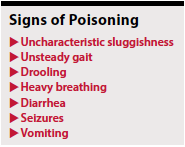It’s tough to be aware of all the things in our environment that could harm our cats. Cats are especially susceptible to poisoning due to their small body size, unique metabolism, and because they lick themselves frequently, which predisposes them to ingesting things. And, as we all know, feline curiosity is tough to control. If there’s something new around, your cat will quickly find it.
According to the Pet Poison Helpline and Morris Animal Foundation, the top 10 household toxins for cats are:
1. Lilies, including day, tiger, and Easter lilies. The entire lily plant is toxic, even water from the vase. We can minimize risk to our cats by not having lilies in the house or yard.
2. Spot on flea/tick medication for dogs. If you use a canine flea/tick medicine that is not safe for cats—and some of the most commonly used ones are not—you must be extra careful that the cat does not come in contact with the product itself or even the dog you put it on until that product is thoroughly dried (watch for “greasy spots” in the dog’s hair). Always check with your veterinarian and read the product label of any canine product to be sure it says safe around cats and kittens. Never put any canine product on a cat, as it can be fatal in some cases. It’s wise to get your flea and tick products from your veterinarian or at least use the exact brands recommended by your veterinarian. Some “knockoff” products have caused serious health problems in pets.
3. Household cleaners. Household cleaners should be safely stored out of reach. Store them in a garage or basement closed off to your cat. If they must be in a cabinet, be sure the cat cannot open the cabinet. Watch for leakage from old products. When cleaning, shut your cats out of the room you’re working in. Make sure the area is well ventilated until the air is clear.
4. Antidepressant medications. Store medications safely. Cats aren’t the big chewers that dogs are, but they can work at a pill bottle to loosen a cap or chew into some packaging. Note that human medications and supplements make up 40% of this list of potential toxins.
5. Essential oils. Consider passing on using essential oils in your home for the safety of your pets. If you must use them, do not let your cat near you or the oil and never put oils on your cat or allow them to lick your skin if you use oils. Provide good ventilation.
6. Anti-inflammatory medications. Use cat-proof storage methods.
7. Rodenticides. These kill rodents and pets. Store them safely behind locked cupboards or in an inaccessible garage or basement. Keep packaging in case your cat does get into some, as you need to let poison control know the exact ingredients if this happens. Don’t let your cat hunt in areas where you have used rodenticides. Consider humane traps, snap traps, or electronic traps to get rid of uninvited critters.
8. Stimulant medications, such as medications for ADD or ADHD. Keep them locked away from your pets.
away from your pets.
9. Onions and garlic. When using garlic and/or onions in cooking, keep the food away from your cats, even little bits that might tempt a curious cat.
10. Vitamin D preparations. These are found in tablets and creams—and rat poison. Signs of Vitamin D poisoning can start within 12 hours of ingestion by a cat.




